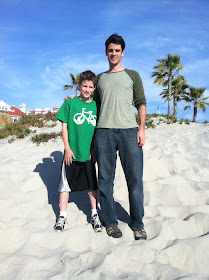I've never liked the parable of The Prodigal Son (Luke 15). I know it gives so many people hope and assurance of the abundant love and forgiveness of God as the father races to welcome home his dissolute son who had spurned him and thrown his life away. Problem is, I've always identified with the older brother in the story, the one who stayed home and was loyal and obedient, and that son doesn't come off looking very good.
It's clear in the Bible that the older son doesn't recognize the father's true character and wants to organize the world according to what he thinks is fair and what's not. He feels hurt and disappointed to see his father lavish love on the younger son when he returns from his life of debauchery. There's a "What about me?" quality in the older brother's response that resonates in my life.
As a kid, I wanted to be my parents' favorite, and I thought I deserved to be because I was a rule follower. When my siblings, especially my sister, did anything wrong, I'd be quick to point it out, thinking this would win me brownie points. Yes, once I even rang the neighbors' door bell to inform them, an older couple, that, "My sister picks her boogers and eats them!" For some reason, they gave me strange looks, and I walked home perturbed.
I tried to help around the house, not so much to ease my mother's burden, but to look good. A glance at an Easter picture of the three siblings from around this time will show you two kids smiling at the camera, and another looking at her siblings' baskets to see if there's been an equitable chocolate distribution.
I didn't understand at the time that we love our children differently, because they are unique, but that it wasn't some big contest.
Whatever I did could not make my parents love me more or love my siblings less. I wss keeping score in an exhausting game of tallying, but my parents weren't. This irked me, because I wanted to live in a world that made sense to me, with neat lines and graphs and deposits and withdrawals. I helped around the house. I could find my shoes. My homework sheets were uncrumpled. I did not want to live in a world where good things happened to "bad people", and in my protected suburban life as a 10 year old with an unfortunate Dorothy Hamill haircut and a year older sister who looked like Farrah Fawcett, I thought I knew who should land squarely in the "bad" category. Life was so unfair!
I learned that my parents were showing me what God's love was like. No amount of striving on my part made a difference, and it was, in fact, embittering and exhausting.
My way left no room for grace and forgiveness. My way put God in a little legalistic box of my making.
And even though I grew and changed (and my sister became my best friend!) I stayed pretty much on this course, wanting to be good and be obedient. It fit with my personality. A life on the wild side just seemed too stressful and out of character to me. When I'd hear about the younger son sowing his wild oats in the parable, well, actually being reduced to eating food out of a pig's trough, my heart would race and I felt like I would get a rash.
Now, after Jack's death, I wonder if deep down inside, I thought that following rules and being a "good girl" would/could/should protect my family and me from heartache. It seems so simplistic, so ridiculous, but I think my righteous indignation that good things happened to bad people (the younger son in the Bible) was really a desire to keep bad things from happening to good people (me, of course!)
So stupid, so flawed. So untrue.
I know that's not the way of this world. Horrible things happen to good people. Children in Africa being preyed upon by warlords. Kids with cancer. Sex slavery. Chronic illness. And on and on and on.
But in my little suburban world, where Dorothy Hamill and Farrah Fawcett may have given way foil highlights and Brazilian blowouts, but where much has stayed the same, I wonder if in trying to be good, or hoping to keep life "fair" I was grasping for control over something I never had any control over in the first place.




































